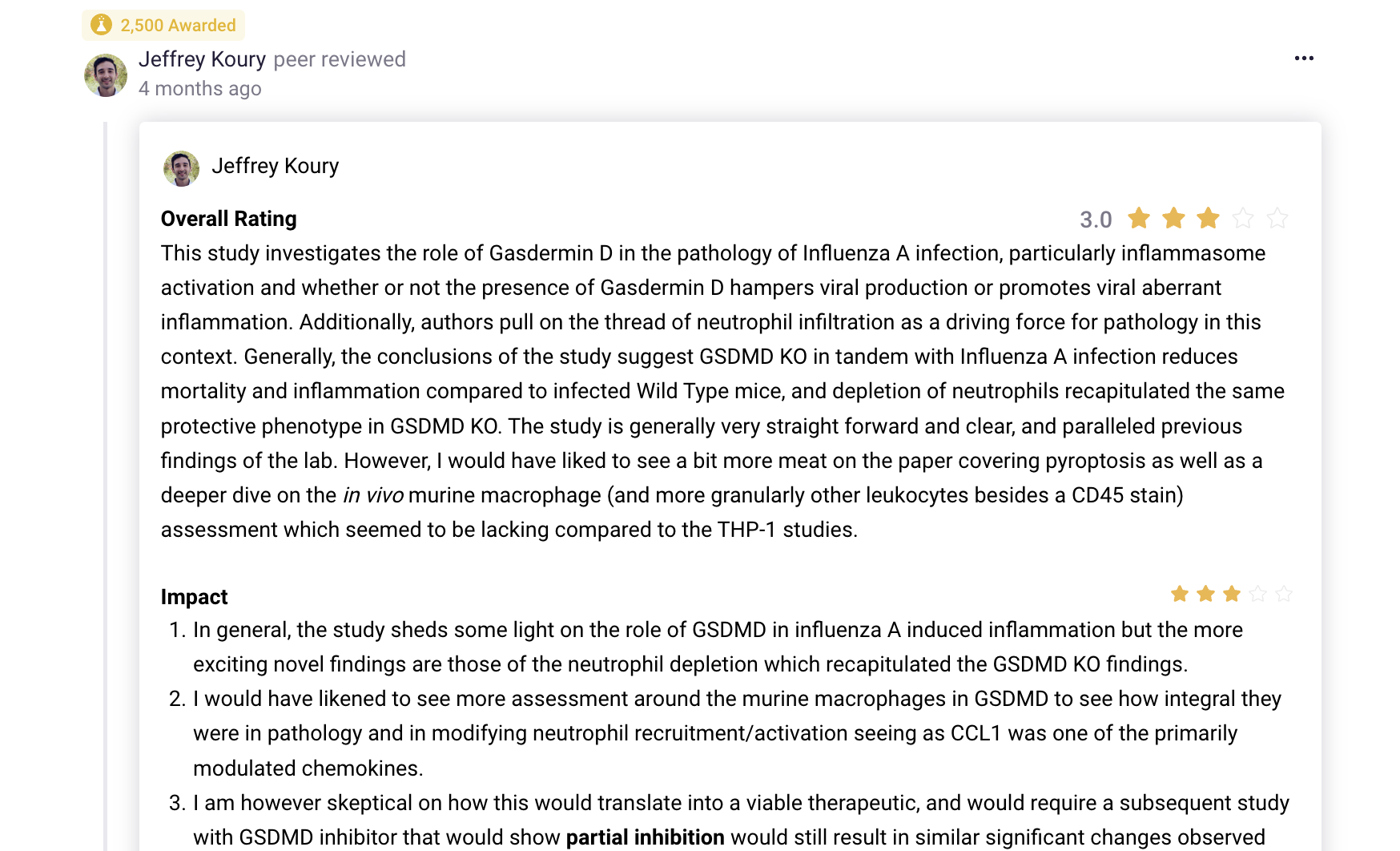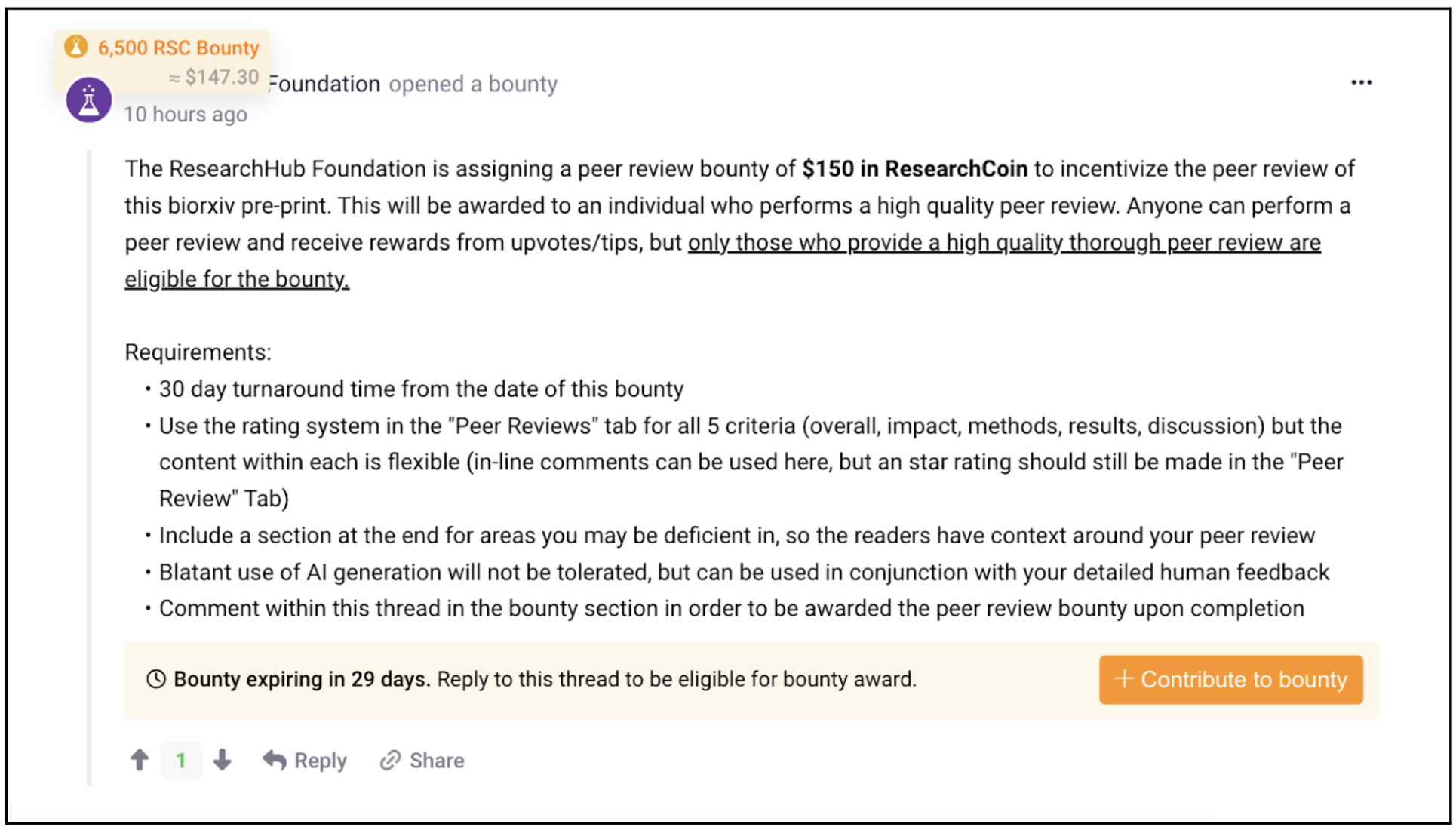Peer review is a vital component of modern scientific research that involves challenging assumptions and pushing fields forward. In the current structure, journals request peer review services on a voluntary basis from researchers (e.g. faculty and post-docs), despite charging oftentimes exorbitant fees for the publication they are requesting review upon. Proper peer review requires that researchers maintain at the cutting edge of their respective fields, which leaves them tight on time. Unsurprisingly, researchers often don’t have the time commitment nor the financial incentive to do the laborious peer review for these articles, and thus articles get bottlenecked in the journal submission process. Misaligned incentives are stifling the pace of science and by extension blunting the efficiency of funding structures.
These cascading effects have historically been difficult to disentangle from the system due to the complicated role they play in career progression, both academically and professionally. Peer Review is a pre-requirement for articles to be indexed on large venues such as PubMed. Additionally it is necessary for the career progression of academic research faculty and alike to peer review for reputable journals. Aside from altruistic intent, these factors likely play a role in why peer review has remained non incentivized. However, communities are taking on a progressive initiative to peer review pre-prints in new and exciting ways, the largest being the journal eLife which is not for profit and open-access. We at the ResearchHub Foundation want to spark further innovation in peer review by addressing the lack of proper economic incentivization with our pilot incentivized peer review initiative.
Incentivized Peer Review
ResearchHub natively provides the ability to crowdsource peer review through their Bounty feature, allowing users to offer ResearchCoin in exchange for scientific knowledge. Using this feature, the ResearchHub Foundation will begin financially incentivizing peer reviews, specifically on a set of curated pre-prints archived on bioRxiv, with an initial pilot program using $2,500 earned from Gitcoin Grants. With this, we want to outsource the peer review to scientists around the globe through voluntary but incentivized participation.

Call to Action
For this initiative, we have curated 16 bioRxiv preprints that span neuroscience, immunology, cell biology, machine learning, and much more. ResearchHub Foundation has uploaded these preprints to ResearchHub and assigned at least $150 worth of ResearchCoin (RSC) to incentivize open Peer Review. Only high quality, rigorous peer reviews will be awarded the bounty.
For general peer review guidelines, please refer to the documentation set forth by the WikiJournal of Science. Keep in mind, peer reviews, comments and other discussions made around any post on ResearchHub will earn RSC when that content is upvoted on top of any bounties awarded. In fact, the rewards for these upvoted content have been increased 4X as per a vote from the community!

If you feel that you are qualified to provide a rigorous peer review (see example) on any of the pre-prints listed below, all relevant details can be found at each link.
-
Peer Review Paper #1: Visuomotor experience induces functional and structural plasticity of chandelier cells
-
Peer Review Paper #2: Neural networks with optimized single-neuron adaptation uncover biologically plausible regularization
-
Peer Review Paper #3: Effort cost of harvest affects decisions and movement vigor of marmosets during foraging
-
Peer Review Paper #4: The Human Microglia Atlas (HuMicA) Unravels Changes in Homeostatic and Disease-Associated Microglia Subsets across Neurodegenerative Conditions
-
Peer Review Paper #5: Utility of nasal swabs for assessing mucosal immune responses towards SARS-CoV-2
-
Peer Review Paper #6: Choline metabolism underpins macrophage IL-4 polarization and RELMα up-regulation in helminth infection
-
Peer Review Paper #7: Single-cell analysis of the nervous system at small and large scales with instant partitions
-
Peer Review Paper #8: Activated interstitial macrophages are a predominant target of viral takeover and focus of inflammation in COVID-19 initiation in human lung
-
Peer Review Paper #9: Metformin may reduce dementia risk through neuroprotection not mitigation of diabetes
-
Peer Review Paper #10: Influence of circular RNA topology on Target RNA-Directed MicroRNA Degradation
-
Peer Review Paper #11: Coordinated inheritance of extrachromosomal DNA species in human cancer cells
-
Peer Review Paper #12: Bidirectional interconversion between mutually exclusive tumorigenic and drug-tolerant melanoma cell phenotypes
-
Peer Review Paper #13: A simple mechanism for epigenetic inheritance of silent chromatin
-
Peer Review Paper #14: Dopaminoceptive D1 and D2 neurons in ventral hippocampus arbitrate approach and avoidance in anxiety
-
Peer Review Paper #15: Spatial Distribution Of Hand-Grasp Motor Task Activity In Spinal Cord Functional Magnetic Resonance Imaging
-
Peer Review Paper #16: Autoimmune inflammation triggers aberrant astrocytic calcium signaling to impair synaptic plasticity
For any questions or clarifications, please reach out to editor@researchhub.foundation.
On behalf of the ResearchHub Foundation, we are greatly looking forward to seeing the global community of researchers engage with this opportunity to spark change in the incentive structure that underpins the vital peer review process.